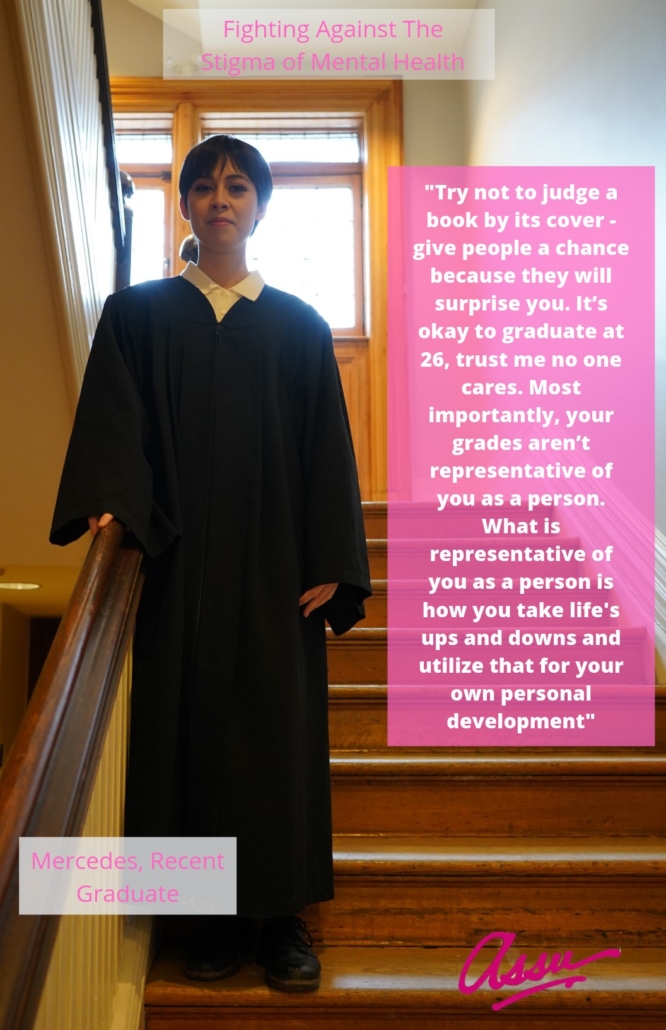Meet Mercedes!
Mercedes is a recent graduate who did a double major in Linguistics and History of Arts. She loves learning new languages and speaks English, Tagalog, and French and is learning Japanese and German. She is currently working as a clinical research assistant studying the areas of speech and oral-motor control and hopes to one day develop her own accessible psychometric test for people with aphasia.
After rediscovering her love for art and finding a new interest in film photography during her undergraduate degree, she decided to try and view all things and people from an artistic lens. She hopes that in doing this she becomes more patient, and better appreciates and understands other people.
Moving On From…
Mercedes went to one of the only self-directed high schools in the Greater Toronto Area (GTA) which proved to be instrumental in teaching her how to time manage. The downside of this was that she wasn’t prepared to sit through 3 hour long lectures, which made it hard for her to focus. Moreover, as she never had class discussions in high school, tutorials were difficult for her. However, she was eventually able to make good friends in her classes because she likes to talk in class, and they remain good friends to this day.
Mercedes began her university career at Ryerson University in September of 2011, but after two months of studies, she realized that it wasn’t for her and enrolled at the University of Toronto during the 2012-2013 academic year. She found it to be very alienating and a big institution to navigate and felt that there was a big gap between what she had learned in high school and what she was expected to know in university. This contributed to negatively impacting her first year at U of T.
Mercedes dealt with severe depression throughout her teenage years, and during the first semester of her first year she was hospitalized and ended up missing two exams. After struggling greatly with her mental health, especially during the second semester of her first year, she decided to take a gap-year in Japan and learn the language while also teaching English there. It was during her time in Japan that she earned a better appreciation for different languages and cultures, and decided to try attending U of T once again, except this time as a Linguistics student.
At the advice of a trusted professor, Mercedes was able to access services at the Center for Addiction and Mental Health (CAMH) which led to her finally being able to register with Accessibility Service and take a reduced course load. Unfortunately, during her first two years back at U of T, she had dealings with Campus Police as a result of her being stalked and harassed by a fellow student. Due to dissatisfaction with the proceedings of her case, Mercedes ended up giving up, and till this day does not know the conclusion of her reports. This, combined with the increasing stress of having to work three jobs in order to afford tuition and temporarily take care of an aunt with aphasia, led to a near fatal suicide attempt at the end of her fourth year. She regards this as a turning point in her life which has helped her re-analyze her goals, create a different outlook on things, and learn which resources to access in order to get the necessary help that she needs.
If not for the support of her close friends and a therapist she sought out on her own after coming back from Japan, she doubts that she would have been able to continue with her education. Going to therapy has given her the tools and confidence to seek help in all domains of her life. She encourages current students to recognize that self-advocacy is not a requirement for healing from past traumas or current mental health issues. Although the university may seem alienating at times, there are plenty of good people who are able to advocate on their behalf when they cannot advocate for themselves. By reaching out to others, Mercedes was able to get the necessary help in order to apply for grants to attend and continue therapy, remove failed grades from her time in hospitalizations, and successfully graduate with both research and conference experience to boot.
Mercedes’ Take Home Message
“It’s okay to take a break. Take that year off, or two or three if need be. Don’t listen to people who say you won’t be able to go back to school if you take a year off. Try more hobbies, because as a person who has a history of mental illness that can be the spark that helps to change your mood.”- to 1st year Mercedes
“Try not to judge a book by its cover – give people a chance because they will surprise you. It’s okay to graduate at 26, trust me no one cares. Most importantly, your grades aren’t representative of you as a person. What is representative of you as a person is how you take life’s ups and downs and utilize that for your own personal development.” – to the people reading this
![]() credits: @shezphotos
credits: @shezphotos

